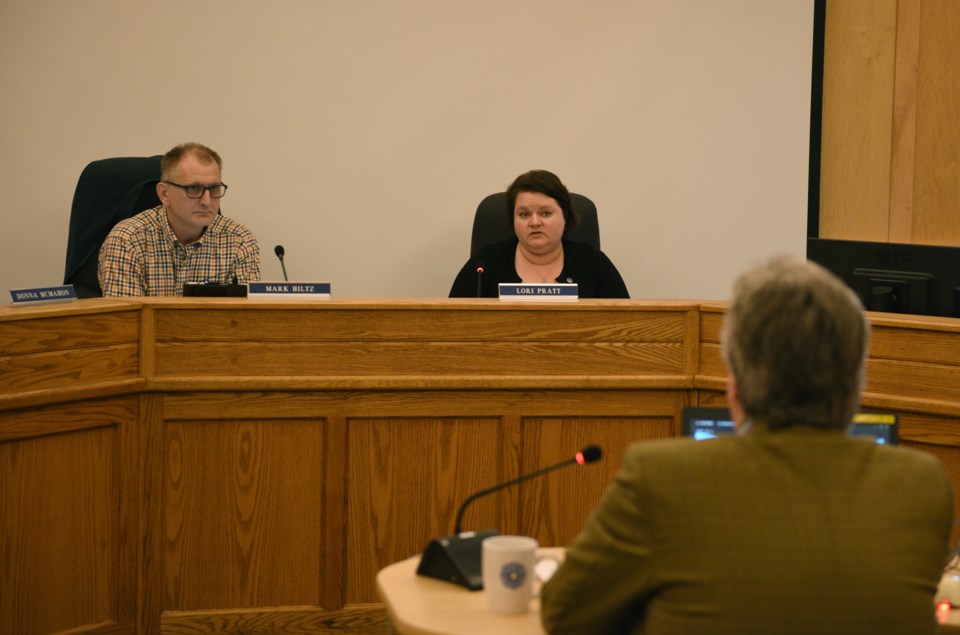A record number ofstaff additions and a swollen operations budget were discussed at length in an at-times emotional March 12 board meeting, but after a two-week postponement for community feedback, Sunshine Coast Regional District (SCRD) directors were ready to put the 2020 budget to bed.
Sechelt directors Alton Toth and Matt McLean – sitting in for Darnelda Siegers who was on vacation – were the sole opponents in the budget adoption vote.
Also in opposition was Sechelt and District Chamber of Commerce chair John Henderson, who spoke as a delegation on behalf of his members and with support from the Coast Community Builders Association.
His presentation, which took place prior to the vote, focused primarily on the addition of 15 full-time equivalents, and on the operating budget, which swelled by $3.2 million from Round 1 budget deliberations to $46.2 million, up from $40 million in 2019.
“The budget proposes a record increase in spending on both operations and capital, a record number of employees being hired, a record number of capital projects in numbers being contemplated, and I believe a record increase in [residential taxes] by between eight and 10 per cent,” Henderson said before reminding directors businesses pay at least double the residential tax bill. “These proposed increases are unaffordable for business in particular and for the public in general, and they’re unrealistically ambitious.”
This year’s capital budget is $26.54 million, up from $16.23 million in 2019. Overall taxes have increased by 12.9 per cent.
He asked the board to delay their vote until they could explain how the staff increases and operating spending was “good value,” reduce the number of capital projects and create a finance advisory committee, among other requests. While an ambitious budget is admirable, he said, “I have to ask given the events of the last several months in Canada, is now the time to be this bold?”
His arguments weren’t enough to sway the board, however.
While several of the directors, including chair Lori Pratt, Area E director Donna McMahon and Area F director Mark Hiltz, said they received numerous calls and emails about the budget, they remained committed to moving ahead, sticking to arguments made at previous budget discussions.
“Your question was is now the time to be bold,” said McMahon in her reply to Henderson. “And the answer is, no. Forty years ago was the time to be bold about climate change. Twenty years ago was the time to be bold about the infrastructure problems that we have here... Unfortunately, it didn’t happen, so we are now in a situation where things that were longstanding problems are becoming emergencies, and we have to act.”
Gibsons director David Croal, who supported adoption, also took a longer view of the increases. “I would be ashamed to pass on to my grandchildren, if I had them, a mess. And if we don’t act now, it’s exactly what we’re going to do.”
Sechelt directors McLean and Toth weren’t convinced.
They cited the limited information about four positions related to strategic initiatives proposed in the budget. “There’s been no information in this budget about why we need a four-person strategic initiatives department,” said McLean. “Creating a new four-person department out of the blue is not the right way forward. If we want to build a new department, we should slowly scale it up.” Instead, he said, work on the water file should be farmed out to contractors, “who we can dismiss once we’re over the hump of this crisis.”
Senior human resources manager Gerry Parker was called on to explain the ambiguity of the positions, saying the job titles had not yet been “formalized” or “finalized.”
“When we’re talking about positions that may be strategic, they could just as easily be an infrastructure position. Perhaps we made a mistake in using the titles that we did to move it forward, but we needed to move forward with something,” he said. He also acknowledged that some of the positions could be part of the SCRD’s bargaining unit, while others may be exempt.
“We have worked very diligently to identify the human resources needs for those projects,” he said.
Tim Howard, who sat in as alternate for Roberts Creek director Andreas Tize, supported the budget, telling directors he was convinced the organization is “mature to the point where it needs this expertise.”
Area A director Leonard Lee said after looking at “each item in detail,” and confirming with the CAO, “I think we’re good.”
“It’s big, it’s tough, but that’s the way it is. And director Croal is right: We’re just passing through and we need something that’s sustainable, workable and delivering for the people.”
Pratt, meanwhile, said the “downfall of the SCRD has always been that we’ve been putting Band-Aids on waterfalls, trying to stop things after they’ve already gotten too far,” and that current staffing levels are “not sustainable.”
“I’ve spent a lot of time reflecting. This has not been easy. Every step of this has not been easy,” she said. “But I will be supporting this moving forward.”
This year’s average residential increases are: 11.7 per cent for Pender Harbour, 8.7 per cent for Halfmoon Bay, 11.3 per cent for Roberts Creek, 10.6 per cent for Elphinstone, 10.9 per cent for West Howe Sound, 10.3 per cent for the Sechelt Indian Government District (SIGD), 9.1 per cent for the District of Sechelt and for the Town of Gibsons, 11.4 per cent.
Only a portion of the tax bill for residents of Gibsons, Sechelt and the SIGD is made up of SCRD taxes.



